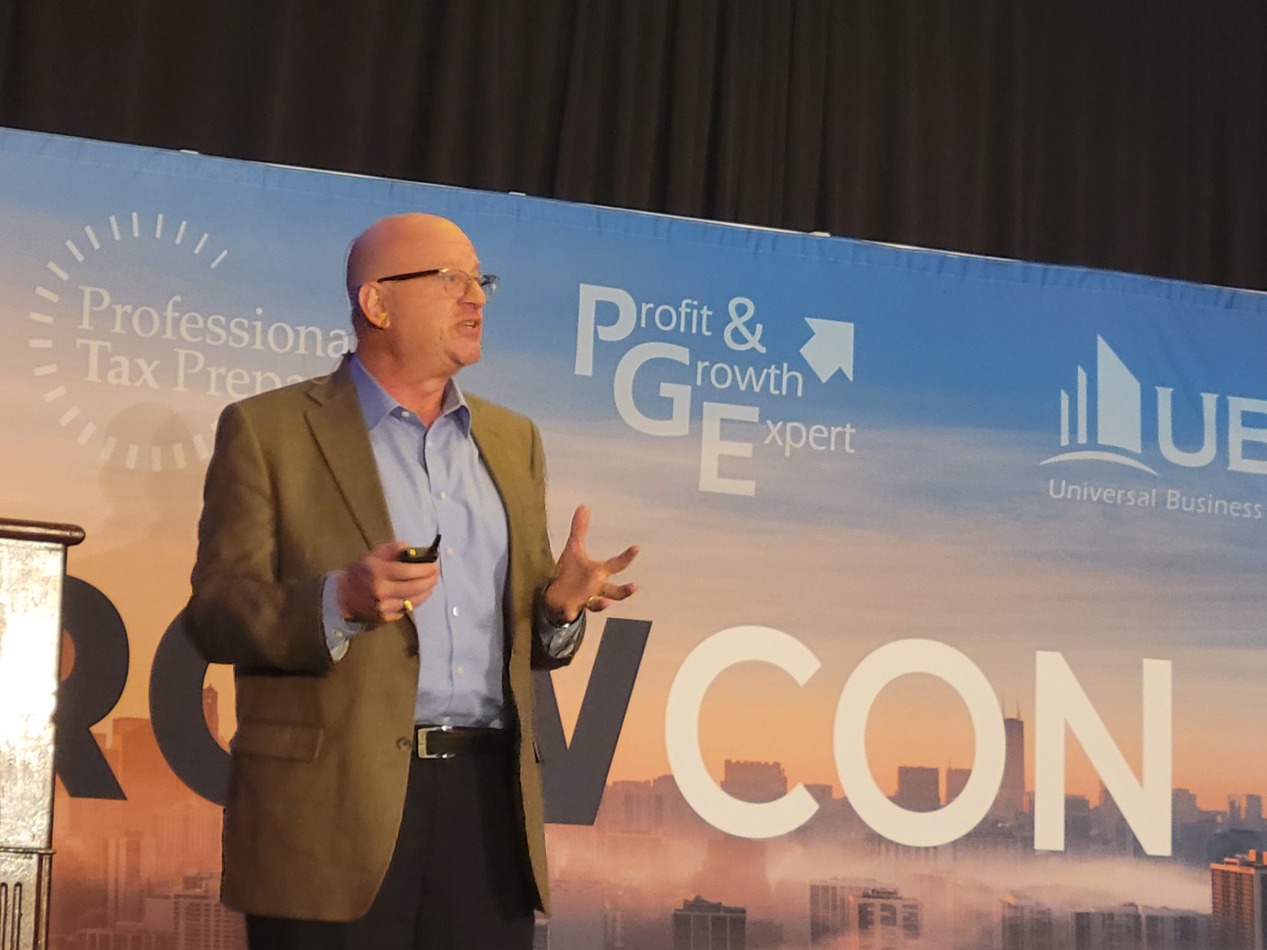In the modern era of accounting, perhaps no topic is more heavily discussed than the talent cycle. It seems like every day there’s a new study about the talent crunch. Online forums for accountants are chock full of posts about professionals who have been or are about to be laid off.
This is a big point of emphasis at TLTurner Group, said CEO Terrell Turner in his presentation at GrowCon 2024. Folks tend to focus on the talent pipeline “drying up,” with many accountants retiring while few students study accounting in college, but Turner has seen the start of the pipeline isn’t the only employment obstacle firms are struggling with.
“For years we’ve been funneling people into the profession, but when they get through the pipeline, there’s nowhere else to go,” Turner said. “Employees will ask, ‘What is my trajectory? What is my growth potential? What can I do afterwards?’ When there aren’t good answers to those questions, people leave.”
Turner realized that there’s a difficult balance to achieve with employees. They need to not only be equipped to handle and enjoy their daily tasks, but do their best when there’s a clearly defined growth path laid out for them that allows them to reach their potential. That means challenging them to do the best they can, because if they’re left to chug along and take care of their responsibilities with little oversight, they’ll likely jump ship when another opportunity arises elsewhere.
That’s why Turner developed the Golden AGE method for firm growth. Instead of giving employees the sink or swim approach, picking one person to train and develop, or evaluating performance purely by the numbers, Turner’s model zeros in on using clear criteria to evaluate employees with room for them to grow.
Turner presented his Golden AGE method on May 7 at GrowCon 2024, held at the Southbank Hotel in Jakcsonville, Florida.
If you weren’t able to join us in Florida, then don’t stress. Today, we’ll look at the highlights from Turner’s presentation. If you’d like to hear his, and the other 12 presenters from GrowCon 2024, talk in full, you can access the full presentations from both days of GrowCon here.
Let’s take a look at some of the key concepts from Turner’s Golden AGE method:
Average, Good, and Excellent
AGE is an acronym for performance evaluation. At the end of each month, Turner’s company uses a rubric to measure employee performance on a scale from “Average,” “Good,” and “Excellent.”
Turner used a bookkeeper as an example for how the evaluation model works: the Average capacity at his firm is to prepare the books for 15 clients a month, with the expectation to deliver reports on time, and with an accuracy rating at 75%. Good performance would be slightly above average, so: preparing the books for 20 clients per month, one day before close (rather than right on time) and 80% accurate. Excellent is 25 per month, three days before close and 90+% accurate.
Laying out what’s expected of employees with such a clearly defined rubric has been a powerful learning experience, Turner said. There are performance incentives for those who achieve above the “average” level, and it makes it very clear to those who are underperforming that they need closer analysis.
Perhaps an employee who is performing below the average standard is misunderstanding a fundamental process, or is dealing with something outside of work. Turner said that the only way to know if an employee can do better is to work with them directly. If there is a technical problem to be addressed, it can be easily fixed by spending some time with a senior employee to mentor them, he said.
Rowing the Same Direction
Turner found that before they installed the Golden AGE method, employees would spend far too much time doing tasks that didn’t contribute much to the overall mission of the company. It’s hard to be frustrated at these employees if they don’t have a clear definition of what’s expected of them.
Especially in the accounting industry, it is a much better experience for both management and the employee if there’s no guesswork to be done, he said.
This model ensures that everyone is “rowing in the same direction,” Turner said. It makes it easy for the employee to identify their key priorities, but also allows them space to excel.
Turner said it’s important to acknowledge that no employee will perform at the same level each month. Life happens. As long as the employee is reaching the “Average” performance markers, the firm will reach its goals. Turner recounted an example of a senior accountant who was dealing with problems taking care of her child. He told her that he’d rather have her perform at an average level and not feel like she’s failing as a mother.
Breaking the Stigma of “Average”
A difficult part of managing employees comes down to choosing which metrics most effectively measure their contribution to the company’s success. Which metrics do you choose, and how high should the bar be?
During this process, it’s important to consider the fact that no employee will perform the same one month compared to the next. So much is going on in their lives that one month might be average, and another might be an excellent one. Basing the “Average” guidelines where they did allowed Turner and his employees to have peace of mind that as long they reached that standard, everything would be fine. The company would get closer to its goals, and the employee has filled the responsibilities outlined in their contract. Everybody wins.
It’s important to note that these evaluation criteria strictly measure a month (or quarter’s) worth of performance. The employee is not an “Average,” “Good,” or “Excellent” person. Turner makes it a priority for his employees to understand that “Average” performance is completely fine with him. People thrived when they had that clarity.
This model also makes it easy to identify potential candidates for performance. Managers can easily pick out who has the capability to take on additional responsibilities.
Breaking the stigma of being labeled as “average” is pivotal in transforming orgnizational culture. Turner emphasizes that being “average” is not a negative assessment but a starting point for growth and developement. By clarifying that evaluations are rooted in objective critera, the methodology dispels the fear of personal judgments. This approach encourages employees to focus on their own progress rather than comparing themselves to others. By creating a stress-free atmosphere, where clear expectations are communicated and understood, organizations can enhance motivation and foster continous improvement. Employees become more engaged, knowing that being labeled “average” is simply part of a developmental journey, with ample support and opportunities for advancment. This shift in perception allows for enhanced performance and satisfaction across diverse teams, proving that clear goals and defined roles can lead to monumental success.
A Call to Action
In conclusion, Turner issues a powerful call to action for organizations to redefine their performance management systems. The time has come to shift from traditional models to ones that prioritize clarity in job expectations and strategic alignment of employee roles with corporate objectives. By adopting the “golden age” methodology, companies can unlock untapped potential within their teams, fostering an environment where every member feels valued and motivated to excel. This approach is not just a framework; it’s a transformative movement that promises to reshape the future of leadership and team dynamics across all industries.
Embrace this revolutionary approach and watch your organization thrive. Whether you’re an executive, a team leader, or an aspiring accountant, the principles of the “golden age” are your key to unlocking a brighter, more successful future. Let’s build teams that are not only efficient but truly exceptional. Together, we can pave the way for a new era of organizational excellence, where every individual is empowered to contribute to collective success.
Access Terrell’s Full Presentation (and the other 13 presentations) from GrowCon 2024
The tips shared in this article are truly the tip of the iceberg when it comes to the amount of game changing insights that presenters shared at GrowCon. Each speaker shared valuable insights for running an accounting business, from building wealth, optimizing the day-to-day processes of the business, and beyond.
Fortunately, you can access the full collection of presentations virtually for just $197. Purchase the complete list of presentations at both days of GrowCon at this link.
And remember that GrowCon 2025 will be held from May 5 to 7 at the Utah Valley Convention Center. Marriott Provo will be the host hotel for the event.
To learn more and register for this can’t miss event for owners of accounting businesses, follow this link.
The lineup of speakers will include experts in tax planning, business development, and client advisory services. Check out highlights from previous GrowCons for free here.
Looking Ahead to 2025
Thank you to all of the speakers who shared their incredible insights at GrowCon 2024 in Jacksonville, Florida. We are extremely excited for GrowCon 2025 in Provo, Utah.
To learn more about how you can start your own accounting business, improve your services, or train your employees, call Universal Accounting at 435-344-2060. Or schedule a time to discuss your future online using this calendar:










